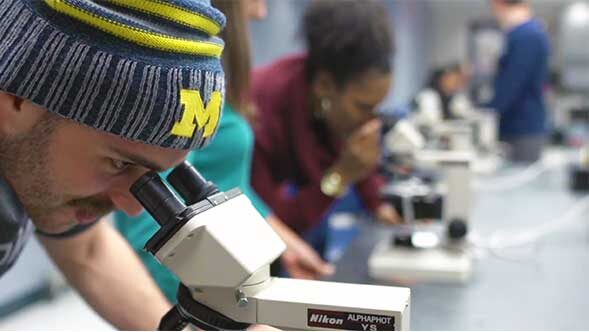Tuned in
 In honor of the University of Michigan’s bicentennial, a short-form documentary series exploring U-M’s history and its connections to the present will air on Detroit Public Television through 2017.
In honor of the University of Michigan’s bicentennial, a short-form documentary series exploring U-M’s history and its connections to the present will air on Detroit Public Television through 2017.
The series, titled “An Uncommon Education — Celebrating 200 Years of the University of Michigan,” consists of 10 vignettes. A new episode will premiere every month, culminating in a broadcast special in December. Episodes will be available online as well.
The Stanley & Judith Frankel Family Foundation funded the series.
The goal is to show how U-M’s great history and tradition connects to its present, says series producer and writer Oliver Thornton.
“It was always kind of designed as not just telling things that happened in the past or not just doing a dry history of the University, but trying to thematically connect things that happened in the past and stories from the history of the University with how those same issues are still being carried forward today on campus,” says Thornton, lecturer II in screen arts and cultures, LSA.
- February: “A True University”
- March: “An Eye for Science”
- April: “An Ear for Excellence”
- May: “A Writer Worth Reading”
- June: “A Miracle Cure”
- July: “A Selfless Cause”
- August: “An Act of Defiance”
- September: “A Century of Voices”
- October: “A Legacy of Leaders”
- November: “An Innovative Spirit”
Love story
The vignettes cover a wide range of topics, including the role of science at U-M, the university’s musical legacy, global outreach, social justice on campus, innovation, and the work of Michigan Medicine, U-M’s academic medical center.
Vignettes will be aired in one-minute broadcasts on DPTV during prime-time and weekend station breaks. Viewers can watch the full-length, 7-8 minute versions on DPTV’s “An Uncommon Education” On Demand website.
The videos also will appear on the U-M YouTube channel.
Talent show
Thornton says his team conducted 44 interviews for the series. Guests include President Mark Schlissel, former President Mary Sue Coleman, Athletic Director Warde Manuel, author and Michigan Today contributor James Tobin, Spectrum Center co-founder Jim Toy, and Angela Dillard, Earl Lewis Collegiate Professor of Afroamerican and African Studies in the Residential College, and associate dean of undergraduate education, LSA.
Bentley Historical Library Director Terrence McDonald says the library contributed almost all of the historical materials for the documentary series. And as someone who is teaching a course about U-M’s history, McDonald says he has learned even more about the institution after watching.
“I think the average person that is a citizen of the state of Michigan or an alumnus of the University of Michigan is going to be surprised at how much they’re going to learn if they spend the time to watch these short, six-minute films,” says McDonald, who also is an Arthur F. Thurnau professor of history. “They’re full of useful information, very interesting, and beautifully done.”
Bicentennial Office Executive Director Gary Krenz says he hopes the series reinforces for people why they love the University and hold it in such esteem.“It’s just really very compelling storytelling,” says Krenz, adjunct lecturer in philosophy, LSA. “So you have some very interesting stories about fascinating people, fascinating moments, important sites at the University of Michigan, and through this storytelling, it’s also making some larger points about the kind of institution that the University is.”
This story originally appeared in The University Record, the official source for faculty-staff news at the University of Michigan.




Daniel Meldrum - 1987
An unknown UM hero was its first benefactor. When UM was first started in Detroit, Rev Monteith had no building in which to teach. George Meldrum a prominent Detroit merchant donated his house to the UM upon his death in 1817. Rev Monteith then used that house to teach until UM constructed its own building. That old farmhouse is now gone but it was the first UM building. In the years up to his death George Meldrum worked with the Masons to raise money for the University and also held a lottery for that purpose. I am a sixth generation descendant of George Meldrum and this info is well known within my family and Detroit records. http://detroithistorical.org/learn/encyclopedia-of-detroit/detroit-schools-19th-century
Reply
Derrick Foster - 1979 1981
Powerful reminder of how much I personally gained from a relatively obscure six year experience, on the campus.
I’ll be watching!
Thank you.
Reply
Brenda Washington - 1996
I would showcase the School of Social Work. During its days in the small sweltering Frieze building days it topped the charts as the number school of social work in the country for many years in a row. Now that it has a new beautiful building it continues its legacy.
Reply